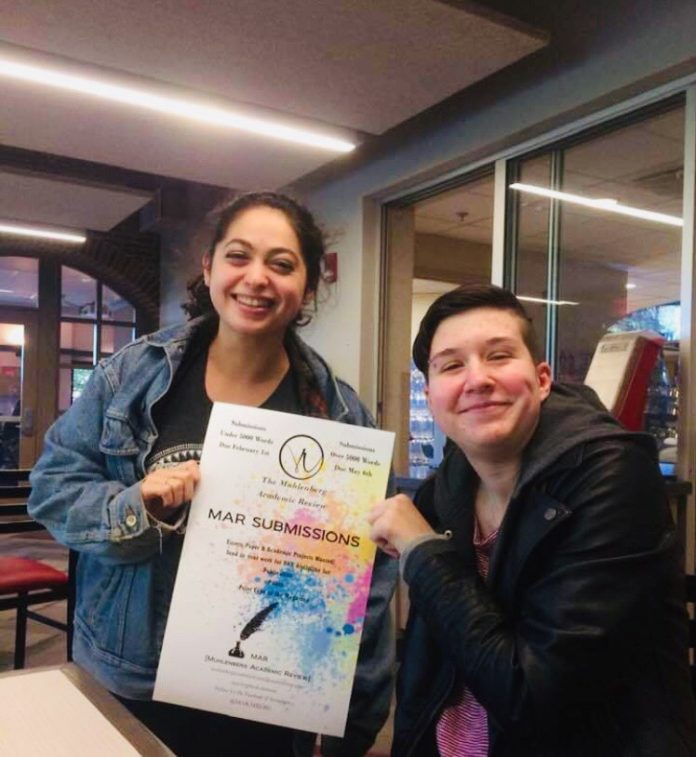At the end of the 2017 spring semester, a group of officers from the Muhlenberg chapter of Sigma Tau Delta English Honors Society came up with the idea for an interdisciplinary academic journal made up of student submitted work. With the groundwork set, the project, known as Muhlenberg Academic Review (MAR), was launched for the 2017-2018 school year.
“We publish exceptional scholarly work from students across all disciplines on campus,” says Blake Chernin ‘19, co-editor-in-chief of MAR. “All student submissions are read anonymously by multiple contributing editors from across the curriculum.”
The MAR logo is equally important to the foundation of the group. According to their website, the logo is an illustration of Gamma Iota, the specific Sigma Tau Delta chapter that Muhlenberg belongs to. Having the organization embedded into the logo connects the founders to the project, who are deeply passionate about the birth and growth of the publication.
“I feel very lucky to have this opportunity to work for MAR, because it means that I get to engage meaningfully with smart and well-written papers in all disciplines,” explains Lizzie Pfeiffer ‘19, also co-editor-in-chief of MAR. “I get to read within discourses that I may not be studying on my own, so I get to learn about all sorts of fascinating new subjects and ideas.”
There will be two deadlines for student submissions to MAR this semester. The first deadline for works under 5,000 words is this Friday, Feb. 8 at 11:59 p.m. The first round of submissions will be for the printed version of the magazine.
Students who are interested in contributing by this Friday’s deadline can send in their work in a word document to muhlenbergacademicreview@muhlenberg.edu.
Later in the semester, MAR will be accepting submissions of over 5,000 words for the online version. Pfeiffer says that the team is working on finalizing their website, where the first edition, as well as this upcoming edition, will be digitally published.
“I think students should be encouraged to submit because we really value a wide variety and diversity in perspective, author, discipline and analysis,” says Pfeiffer. “No one should feel like they’re not going to be accepted because of their specific discourse. This is why MAR was created: to show our student base all of the impressive work we’re doing in our classes and with our liberal arts education.”
Pfeiffer also notes that the MAR executive board is made up predominantly of writing tutors, who see the value in writing and creativity, and will be supportive of those who submit.
“Having an on-campus publication is an excellent resume builder, but more than that, students get an opportunity to share work that is normally only seen by themselves and their professors but which deserves to be shared and read more widely,” says Chernin. “Muhlenberg students do exceptional work — it ought to be shared.”
The concept of an anthology of student work is familiar to the Muhlenberg community, with publications such as Muses, an art and literary magazine, already in existence. However, what makes MAR different, Chernin explains, is its academic rather than traditionally creative content.
“MAR to me means a real distinction from some of the other platforms on campus that are specialised for creative writing, like Muses for example,” adds Pfeiffer. “I love creative writing but I also really cherish and try to promote the creativity and enlightened thinking that goes into a spectacular analytical essay.”
Chernin recognizes that MAR has definitely evolved within the year that it has existed, pointing out a specific improvement in the organization of the group’s agenda. Nonetheless, Chernin ensures that there is still a commitment and dedication to their original mission.
According to the MAR mission statement: “MAR embodies the liberal arts’ aspiration, and like the ocean, to which its name also alludes, MAR’s purpose is to turn the tide towards an overall more engaged and open-minded academic student body.”
“My goals for the future of MAR are just to keep getting the word out and get more students to submit their work” says Pfeiffer. “We’re still just a ‘start-up’ so to speak, so we’re small, but I know all of us on the board are super passionate about our work, and we’re eager to celebrate the amazing talent and work ethic of our students.”
Sydney Coplin is a senior majoring in Media and Communication. She is currently spending her final semester of college interning and studying in Washington, D.C. She has previously been on staff as News Editor and Managing Editor.






















